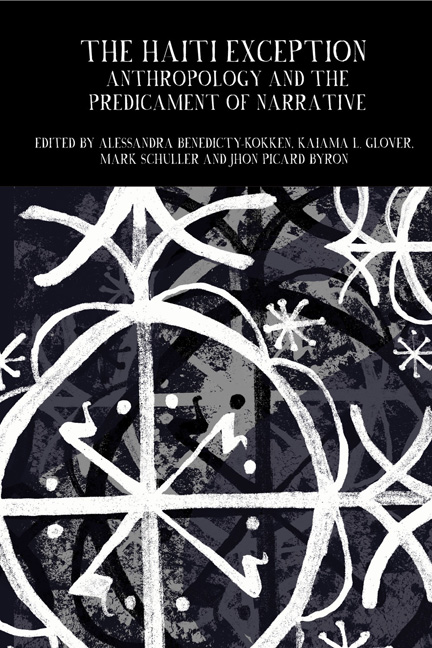Book contents
- Frontmatter
- Contents
- Editors’ Introduction
- I Tracing Intellectual Histories
- II Interrogating the Enquiring Self
- III On Nation-Building: Histories, Theories, Praxes
- Haiti, Politics and Sovereign (Mis)recognitions
- Haitian Culture in the Informational Economies of Humanitarian Aid
- Urban Poetics
- Epilogue: Kalfou Danje: Situating Haitian Studies and My Own Journey within It
- Notes on Contributors
- Index
Haiti, Politics and Sovereign (Mis)recognitions
from III - On Nation-Building: Histories, Theories, Praxes
- Frontmatter
- Contents
- Editors’ Introduction
- I Tracing Intellectual Histories
- II Interrogating the Enquiring Self
- III On Nation-Building: Histories, Theories, Praxes
- Haiti, Politics and Sovereign (Mis)recognitions
- Haitian Culture in the Informational Economies of Humanitarian Aid
- Urban Poetics
- Epilogue: Kalfou Danje: Situating Haitian Studies and My Own Journey within It
- Notes on Contributors
- Index
Summary
There are two stories that Haiti opens for political anthropology. The first has to do with the kinds of politics that have and have not been possible in the region, and the kinds of sovereignty that have and have not been recognized and valued. The second, related, story has had to do with the links between cultural alterity and nation-building or national identity. Both these stories, of course, are not bounded regionally, but reflect broader modernist imperatives. While the editors of this volume have asked us to think about the relationship between Haiti and the discipline of anthropology using Trouillot's Global Transformations and René Depestre's ‘La France et l'Haïti’ as points of departure, this essay posits three additional cornerstones: Jean Price-Mars's Ainsi parla l'oncle, Melville Herskovits's Life in a Haitian Valley and Trouillot's State against Nation. These texts provide us with certain frames for thinking about the various kinds of relationships between states and nations, between revolution and everyday life, between cultural practice and nationalist ‘patrimony’, and between the past and the present. Together, the texts also show us, in different ways, how and why particular questions have been foregrounded while others have remained marginalized.
In this essay, I want to use these texts, among others, to think through questions of nationalist integration, peasant incorporation and global developmentalism. I will argue that the anthropology of Caribbean peasantries from the 1930s to 1950s is directly related to the anthropology of violence in the 2000s and 2010s, and that in both cases what has really been at stake is the question of sovereignty – how it is to be framed, addressed and expressed. My purpose is to show how peasants became key to nation-building in the British West Indies in two ways: first, in relation to developmentalist models rooted in respectable missionary values (rather than in the decadence of the plantation); and second vis-à-vis the elaboration of a set of cultural practices that could be shared as foundational to a national identity. If, within the British West Indies and Haiti, the burning debates of the 1930s had to do with what kind of development strategies would move these societies forward and what forms of subjectivity could be nurtured in order to generate a nationalist concept of belonging and citizenship, today the questions that keep us up at night in both contexts have to do with violence – political, structural and epistemological.
- Type
- Chapter
- Information
- The Haiti ExceptionAnthropology and the Predicament of Narrative, pp. 137 - 155Publisher: Liverpool University PressPrint publication year: 2016



